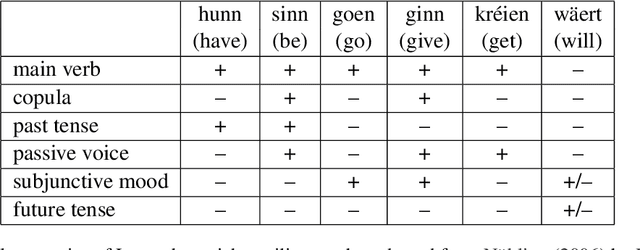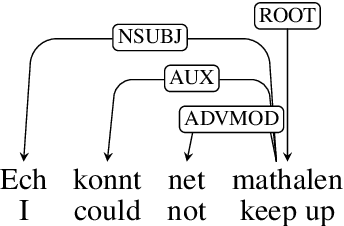Christoph Purschke
Neural Text Normalization for Luxembourgish using Real-Life Variation Data
Dec 13, 2024



Abstract:Orthographic variation is very common in Luxembourgish texts due to the absence of a fully-fledged standard variety. Additionally, developing NLP tools for Luxembourgish is a difficult task given the lack of annotated and parallel data, which is exacerbated by ongoing standardization. In this paper, we propose the first sequence-to-sequence normalization models using the ByT5 and mT5 architectures with training data obtained from word-level real-life variation data. We perform a fine-grained, linguistically-motivated evaluation to test byte-based, word-based and pipeline-based models for their strengths and weaknesses in text normalization. We show that our sequence model using real-life variation data is an effective approach for tailor-made normalization in Luxembourgish.
Text Generation Models for Luxembourgish with Limited Data: A Balanced Multilingual Strategy
Dec 12, 2024



Abstract:This paper addresses the challenges in developing language models for less-represented languages, with a focus on Luxembourgish. Despite its active development, Luxembourgish faces a digital data scarcity, exacerbated by Luxembourg's multilingual context. We propose a novel text generation model based on the T5 architecture, combining limited Luxembourgish data with equal amounts, in terms of size and type, of German and French data. We hypothesise that a model trained on Luxembourgish, German, and French will improve the model's cross-lingual transfer learning capabilities and outperform monolingual and large multilingual models. To verify this, the study at hand explores whether multilingual or monolingual training is more beneficial for Luxembourgish language generation. For the evaluation, we introduce LuxGen, a text generation benchmark that is the first of its kind for Luxembourgish.
LuxBank: The First Universal Dependency Treebank for Luxembourgish
Nov 07, 2024



Abstract:The Universal Dependencies (UD) project has significantly expanded linguistic coverage across 161 languages, yet Luxembourgish, a West Germanic language spoken by approximately 400,000 people, has remained absent until now. In this paper, we introduce LuxBank, the first UD Treebank for Luxembourgish, addressing the gap in syntactic annotation and analysis for this `low-research' language. We establish formal guidelines for Luxembourgish language annotation, providing the foundation for the first large-scale quantitative analysis of its syntax. LuxBank serves not only as a resource for linguists and language learners but also as a tool for developing spell checkers and grammar checkers, organising existing text archives and even training large language models. By incorporating Luxembourgish into the UD framework, we aim to enhance the understanding of syntactic variation within West Germanic languages and offer a model for documenting smaller, semi-standardised languages. This work positions Luxembourgish as a valuable resource in the broader linguistic and NLP communities, contributing to the study of languages with limited research and resources.
Guided Distant Supervision for Multilingual Relation Extraction Data: Adapting to a New Language
Mar 27, 2024



Abstract:Relation extraction is essential for extracting and understanding biographical information in the context of digital humanities and related subjects. There is a growing interest in the community to build datasets capable of training machine learning models to extract relationships. However, annotating such datasets can be expensive and time-consuming, in addition to being limited to English. This paper applies guided distant supervision to create a large biographical relationship extraction dataset for German. Our dataset, composed of more than 80,000 instances for nine relationship types, is the largest biographical German relationship extraction dataset. We also create a manually annotated dataset with 2000 instances to evaluate the models and release it together with the dataset compiled using guided distant supervision. We train several state-of-the-art machine learning models on the automatically created dataset and release them as well. Furthermore, we experiment with multilingual and cross-lingual experiments that could benefit many low-resource languages.
What Do Dialect Speakers Want? A Survey of Attitudes Towards Language Technology for German Dialects
Feb 19, 2024



Abstract:Natural language processing (NLP) has largely focused on modelling standardized languages. More recently, attention has increasingly shifted to local, non-standardized languages and dialects. However, the relevant speaker populations' needs and wishes with respect to NLP tools are largely unknown. In this paper, we focus on dialects and regional languages related to German -- a group of varieties that is heterogeneous in terms of prestige and standardization. We survey speakers of these varieties (N=327) and present their opinions on hypothetical language technologies for their dialects. Although attitudes vary among subgroups of our respondents, we find that respondents are especially in favour of potential NLP tools that work with dialectal input (especially audio input) such as virtual assistants, and less so for applications that produce dialectal output such as machine translation or spellcheckers.
 Add to Chrome
Add to Chrome Add to Firefox
Add to Firefox Add to Edge
Add to Edge